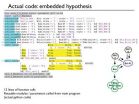(Press-News.org) HOUSTON — The angiogenesis inhibitor bevacizumab (Avastin) failed to increase overall survival (OS) or statistically significant progression-free survival (PFS) for glioblastoma patients in the frontline setting, according to a study led by researchers at The University of Texas MD Anderson Cancer Center.
The study appears in the New England Journal of Medicine, and was first presented on the plenary session of the American Society of Clinical Oncology 2013 Annual Meeting by Mark Gilbert, M.D., professor in MD Anderson's Department of Neuro-Oncology.
Glioblastoma is both the most common and lethal form of brain cancer. More than 12,000 people will be diagnosed with the disease in 2013, with an average survival rate of less than 18 months, said Gilbert.
Bevacizumab works as a monoclonal antibody against VEGF-A, which is produced by glioblastoma to stimulate blood vessel growth. The angiogenesis inhibitor first showed promise in glioblastoma as clinicians reported positive results treating the disease under approved compassionate use.
Numerous institutional studies then found similar results: a 35-40 percent objective response rate, or tumor shrinkage, of more than 50 percent, and a six-month PFS rate in the mid-30 percent, said Gilbert, the study's senior author. With those findings, in May 2009, the FDA granted an accelerated registration of bevacizumab in the second-line setting.
However, before this trial, no randomized, double-blind studies with the drug in glioblastoma had been conducted.
"Obviously, glioblastoma is a cancer with too few effective therapies," said Gilbert, who also holds the Blanche Bender Professorship in Cancer Research. "When we launched this study, those in the field of brain cancer – both the scientific and patient communities -- were excited. Bevacizumab recently received approval in the second-line (recurrent disease) setting, and we knew some physicians were already giving the drug as a frontline therapy -- even with virtually no data to support that decision. It was important from a patient care and regulatory standpoint that we conduct this trial."
The Phase III, international study (RTOG 0825) was a collaboration of three cooperative groups: RTOG, NCCTG and ECOG.
The randomized, double-blind, placebo-controlled study registered 978 and enrolled 637 patients, respectively, all of whom were newly diagnosed with glioblastoma.
Participants underwent surgery to resect some or most of the tumor, received the standard of care of chemoradiation with temozolomide, and were randomized to receive either bevacizumab or placebo. The study was designed with two primary endpoints: PFS and overall survival OS.
Two distinguishing factors of the study design include: crossover to bevacizumab in the placebo arm at the time of progression, and longitudinal assessment of symptom burden, neurocognitive function and quality of life.
"With the crossover, we could determine the possible overall, or progression-free survival benefits that could distinguish the potential benefits of early versus later use of bevacizumab," Gilbert said. "Also, there may be some alternative advantages for delaying progression in the disease. In order to interpret that possible delay in progression, it was important to understand what the quality of the survival of that possible progression free survival interval."
A third distinction: the study was designed to look at the impact of pre-specified molecular markers -- a nine-gene signature expression and MGMT methylation -- to determine if a subgroup that specifically benefited from bevacizumab could be identified.
The researchers found no difference in OS between the bevacizumab and placebo arms, 15.7 and 16.1 months, respectively. PFS did not reach the pre-set level statistical significance -- although longer ¬¬in those taking bevacizumab upfront (10.7 months), compared to in those receiving placebo (7.3 months). When looking at the molecular markers, no subgroup of patients that benefitted from bevacizumab could be identified, said Gilbert.
Bevacizumab was associated with a higher rate of toxicities, including hypertension, bleeding, deep vein thrombosis and pulmonary embolism, and gastrointestinal perforation. Those on the therapy also experienced increase rates of symptom burden and neurocognitive decline, as well decreased quality of life, compared to those on placebo.
"Whereas previous studies in recurrent glioblastoma have demonstrated clinical benefit leading to FDA approval of the therapy, our study did not find a benefit using bevazicumab in the frontline," said Gilbert.
INFORMATION:
In addition to Gilbert, others on the international study include: Minesh P. Mehta, M.D., senior author, University of Maryland; Jeffrey S. Wefel, Ph.D., Paul D. Brown, M.D., Ivo, W. Tremont-Lukats, M.D., Eric P. Sulman, M.D., Ph.D., Kenneth D. Adalpe, M.D., all from MD Anderson; Terri S. Armstrong, Ph.D., MD Anderson and The University of Texas Health Science Center School of Nursing at Houston; James J. Dignam, Ph.D., Stephanie Pugh, Ph.D., Minhee Won, all of American College of Radiology; Deborah T. Blumenthal, M.D., Tel Aviv Medical Center; Michael A. Vogelbaum, M.D., Ph.D., Cleveland Clinic; Howard Colman, M.D., Ph.D., The University of Utah; Arnab Chakravarti, , M.D., Ohio State University; Robert Jeraj, Ph.D., University of Wisconsin; Kurt A. Jaeckle, M.D., Mayo Clinic; David Schiff, M.D., University of Virginia; Volker W. Stieber, M.D., Southeast Cancer Control Consortium; David G. Brachman, M.D., Barrow Neurologic Institute; Maria Werner-Wasik, M.D., Thomas Jefferson University; and Walter J. Curran, Jr. M.D., Emory University
Gilbert is on Roche's advisory board. The study was supported by the National Cancer Institute, clinicaltrials.gov number, NCT00884741, with additional support from an unrestricted grant from Genentech.
Bevacizumab offers no benefit for newly diagnosed glioblastoma, MD Anderson-led study finds
2014-02-20
ELSE PRESS RELEASES FROM THIS DATE:
Bevacizumab (Avastin) fails to improve survival for newly diagnosed glioblastoma patients
2014-02-20
BALTIMORE – February 19, 2014. Adding bevacizumab (Avastin) to standard chemotherapy and radiation treatment does not improve survival for patients newly diagnosed with the often deadly brain cancer glioblastoma, researchers report in the Feb. 20 issue of the New England Journal of Medicine.
"We didn't see an improvement in overall survival or a statistically significant increase in progression-free survival, as defined in the context of this trial," says the study's senior author, Minesh P. Mehta, M.B., Ch.B., Professor of Radiation Oncology at the University of Maryland ...
SDSC team develops multi-scale simulation software for chemistry research
2014-02-20
Researchers at the San Diego Supercomputer Center at the University of California, San Diego, have developed software that greatly expands the types of multi-scale QM/MM (mixed quantum and molecular mechanical) simulations of complex chemical systems that scientists can use to design new drugs, better chemicals, or improved enzymes for biofuels production.
A paper outlining the research, titled 'An Extensible Interface for QM/MM Molecular Dynamics Simulations with AMBER' and conducted by members of the Walker Molecular Dynamics Lab (WMD) at SDSC, was featured on the cover ...
Clutter cutter
2014-02-19
WASHINGTON D.C. Feb. 19, 2014 -- Life can be messy at all scales, requiring different organizational strategies -- from cleaning the house, to removing damaged or expired cells from the body to avoid cancer progression.
In a messy house, people use computers to manage paper and photo clutter; companies use computer systems to track their inventory. Now a team of researchers at Vanderbilt University in Nashville, Tenn., is taking a similar approach to cell-molecular inventory control for cancer. They have created computer models, using their programming framework (PySB), ...
Does more stress equal more headaches?
2014-02-19
PHILADELPHIA – A new study provides evidence for what many people who experience headache have long suspected—having more stress in your life leads to more headaches. The study released today will be presented at the American Academy of Neurology's 66th Annual Meeting in Philadelphia, April 26 to May 3, 2014.
For the study, 5,159 people age 21 to 71 in the general population were surveyed about their stress levels and headaches four times a year for two years. Participants stated how many headaches they had per month and rated their stress level on a scale of zero to ...
Insurance status may influence transfer decisions in trauma cases, Stanford study reveals
2014-02-19
STANFORD, Calif. — Emergency rooms are less likely to transfer critically injured patients to trauma centers if they have health insurance, according to a new study by researchers at the Stanford University School of Medicine.
The counterintuitive finding suggests that insured patients are more at risk for receiving sub-optimal trauma care than uninsured patients are.
Although a majority of severely injured trauma patients are initially taken to trauma centers, at least one-third are taken to non-trauma centers. In these cases, emergency room doctors must assess the ...
HPV vaccination is associated with reduced risk of cervical lesions in Denmark
2014-02-19
A reduced risk of cervical lesions among Danish girls and women at the population level is associated with use of a quadrivalent HPV vaccine after only six years, according to a new study published February 19 in the Journal of the National Cancer Institute.
Two HPV vaccines are currently available and have proven to be highly effective against HPV16/18-associated cervical cancer. One of these vaccines, a quadrivalent vaccine, was licensed in Denmark in 2006, and it was subsequently incorporated into general childhood vaccination programs for girls free of charge and ...
Whole genome analysis, stat
2014-02-19
Although the time and cost of sequencing an entire human genome has plummeted, analyzing the resulting three billion base pairs of genetic information from a single genome can take many months.
In the journal Bioinformatics, however, a University of Chicago-based team—working with Beagle, one of the world's fastest supercomputers devoted to life sciences—reports that genome analysis can be radically accelerated. This computer, based at Argonne National Laboratory, is able to analyze 240 full genomes in about two days.
"This is a resource that can change patient management ...
Study shows in vivo endomicroscopy improves detection of Barrett's esophagus-related neoplasia
2014-02-19
DOWNERS GROVE, Ill. – February 19, 2014 – New research shows that the addition of confocal laser endomicroscopy to high-definition white-light endoscopy enables improved real-time endoscopic diagnosis of Barrett's esophagus dysplasia (neoplastic tissue) by using targeted biopsies of abnormal mucosa to reduce unnecessary mucosal biopsies and potentially reduce costs. It may also positively influence patient care by changing the plan for immediate endoscopic management. The study appears in the February issue of GIE: Gastrointestinal Endoscopy, the monthly peer-reviewed scientific ...
RXTE reveals the cloudy cores of active galaxies
2014-02-19
VIDEO:
Zoom into the cloudy heart of an active galaxy. This animation shows an artist's rendition of the cloudy structure revealed by a study of data from NASA's Rossi X-Ray Timing...
Click here for more information.
Picture a single cloud large enough to span the solar system from the sun to beyond Pluto's orbit. Now imagine many such clouds orbiting in a vast ring at the heart of a distant galaxy, occasionally dimming the X-ray light produced by the galaxy's monster black ...
NuSTAR helps untangle how stars explode
2014-02-19
For the first time, an international team of astrophysicists, including Lawrence Livermore National Laboratory scientists, have unraveled how stars blow up in supernova explosions.
Using NASA's Nuclear Spectroscopic Telescope Array (NuSTAR) – a high-energy X-ray observatory - the international collaboration created the first-ever map of radioactive material in a supernova remnant, named Cassiopeia A, or Cas A for short. The findings reveal how shock waves likely rip apart massive dying stars, and ultimately end their lives.
A supernova is the cataclysmic death of a ...


